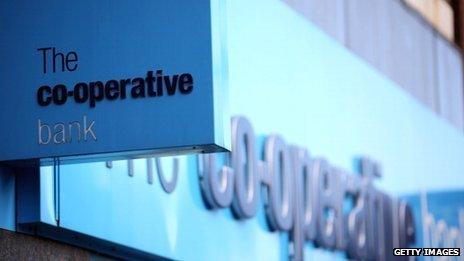Co-op to report worst results in history
- Published
- comments

The group's banking arm was hit by financial trouble and scandal last year
The Co-op Group's losses for 2013 are expected to be greater than £2bn, by far the worst in its history, when they are announced on 26 March.
I also understand that as the first stage in trying to revitalise the group as a whole, its chief executive, Euan Sutherland, will tell members of the Co-op's regional boards on Saturday that its substantial farming operation, which includes 15 farms, will be sold.
He will also reveal that Co-op is actively considering the sale of its 750 pharmacies, which generated revenues of £764m in 2012. "They are likely to be sold, but a formal decision hasn't yet been made," said a source.
Co-op Group's farms are mostly arable, producing cereal for bakers. They supply only a tiny proportion of the food in its stores.
As for the pharmacies, they have come under financial pressure, as the NHS tries to save money on prescriptions, and are not thought to be well integrated with other Co-op activities.
Rescue
According to well-placed sources, the huge £2bn-plus losses to be revealed at Co-op Group stem mainly from its bank - which was rescued at the end of 2013 - together with a reduction in the value of the stores and goodwill it acquired with the Somerfield takeover of 2009 (what's known as a write-down).
For the first half of 2013, Co-op Group generated a pre-tax loss of £559m, following a loss in the previous year of £648m.
Since then, Co-op Group has been forced to recognise a collapse to nothing in the value of its investment in Co-op Bank, as part of a rescue which saw hedge funds and other investors emerging with majority ownership of the bank.
Job cuts
Over four years, Co-op Group is planning to cut running costs by £500m, of which it has already identified £100m of savings.
To achieve these cuts, I am told there will be thousands of job losses, probably between 4,000 and 5,000 by 2017, especially in head office and in support positions.
But Mr Sutherland and his board colleagues have yet to calculate precisely how many jobs will go, and he is not expected to give details for some weeks yet.
Euan Sutherland, speaking in February: "The business lost its way"
Co-op Group is by far the largest enterprise in the UK run on co-operative or mutual lines. It has millions of members, of whom tens of thousands are activists, who participate in elections for local boards.
Early leaks of the scale of the reconstruction of the group are fomenting tension between the activists and professional management led by Mr Sutherland.
"We worry that the board is exaggerating the scale of the crisis, including losses, to turn the Co-op into much more of a conventional business, and move it away from its democratic and ethical roots," said one.
Battle
Mr Sutherland won't unveil the full remaking of the Co-op until around the time of its annual meeting on 17 May.
He is carrying out a survey of how the public sees the Co-op, called "Have your Say", which has already seen more than 80,000 people express a view on how the Co-op should change.
Among the questions put to them, they are being asked whether the Co-op Group should continue paying a dividend to members, rather than simply cut prices, and whether it should continue to make financial contributions to the Co-operative Party, which in turn supports the Labour Party.
Co-op activists are concerned that the survey can be filled in by anyone, not just Co-op members, and they fear that the wording of the questions is designed to elicit a negative response on continued political donations, thus ending all ties to the Labour Party.
"There is going to be quite a battle over this," said one.
BBC business reporter Steph McGovern looks back at the history of the Co-operative Group and hears the views of some customers